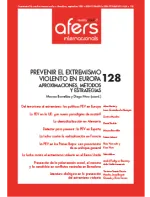Preventing social polarisation, racism and xenophobia in Barcelona’s neighbourhood conflicts

Anabel Rodríguez Basanta, Jefa del Departamento de Derechos de Ciudadanía, Ayuntamiento de Barcelona. arodriguezbas@bcn.cat
Aida Guillén Lanzarote, Gerente del Distrito de Sants-Montjuïc, Ayuntamiento de Barcelona. aguillen@bcn.cat
The city of Barcelona has a significant array of resources and ample experience in prevention and management of neighbourhood conflicts. Yet there is no specific methodology available for analysing the extent to which social conflicts of discriminatory backgrounds generate situations of hostile social polarisation. On the basis of studying the institutional perspective on, and response to two situations of neighbourhood conflict — deriving from the opening of an Islamic religious centre, and from the presence in the area of groups of young, unaccompanied immigrants — this study evaluates the usefulness of the model suggested by Brandsma (2017) for analysing social polarisation, and explores the possible scope and characteristics of polarisation associated with these kinds of conflict.
Key Words: social polarisation, racism, xenophobia, preventing violent extremism, Barcelona, neighbourhood conflicts
How to cite this article: Rodríguez Basanta, Anabel y Guillén Lanzarote, Aida. «Prevención de la polarización social, el racismo y la xenofobia en conflictos vecinales en Barcelona». Revista CIDOB d’Afers Internacionals, n.º 128 (septiembre de 2021), p. 175-200. DOI: https://doi.org/10.24241/rcai.2021.128.2.175
>> The full text articles are available in Spanish language, although in this issue some of them are also available in English language.